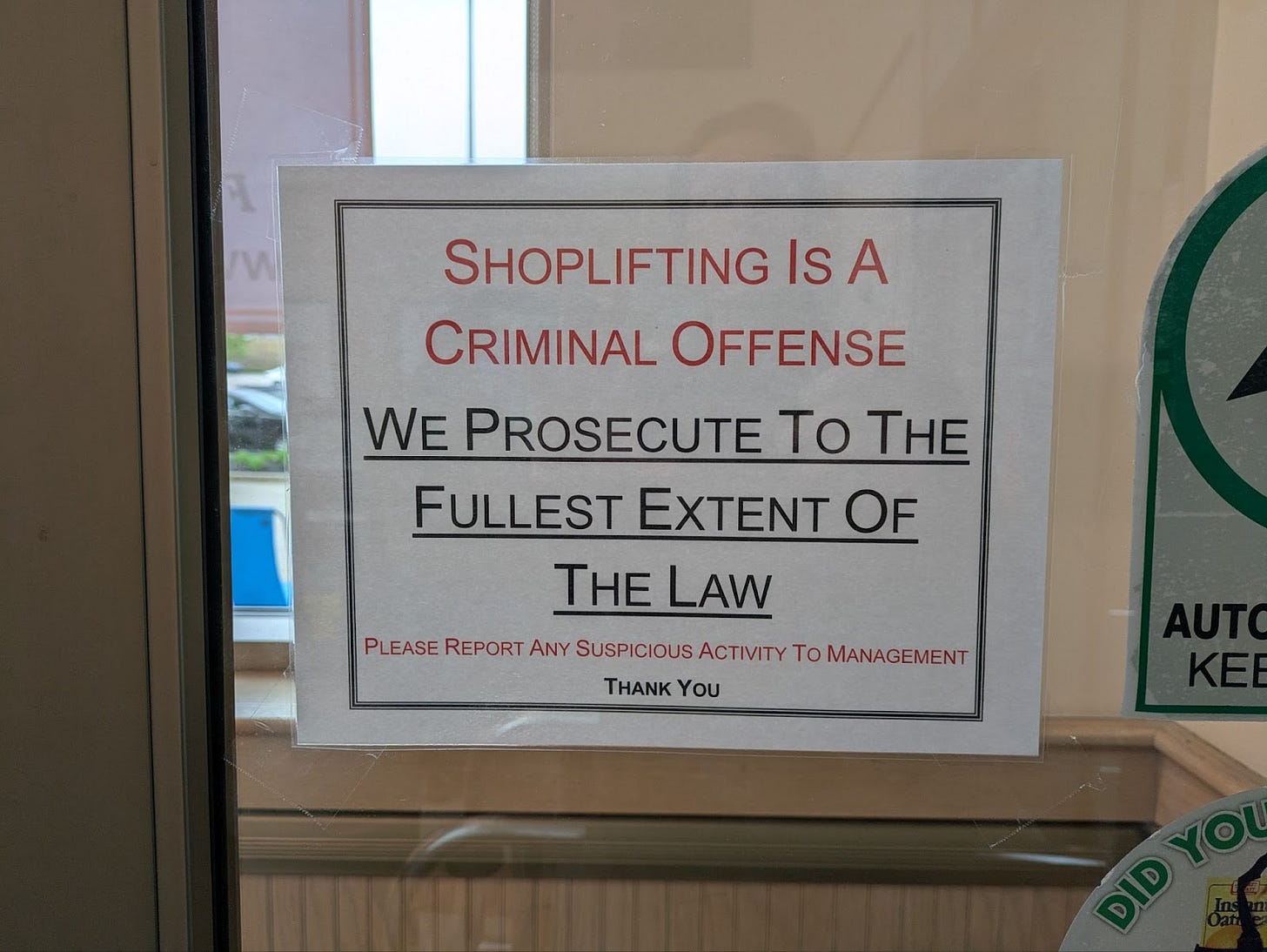As Maine goes, so goes the nation. political maxim
A notable virtue of Substack is that it offers a range of authentic voices and views in an increasingly corrupted information culture. In sum, Substack serves as a vital counterweight to our morally bankrupt, mentally diseased mainstream media.
One of the livelier such renegade voices on Substack belongs to El Gato Malo, who last month posted a thought-provoking piece entitled:
“The Second World.”
In it, EGM describes how we have arrived at our current entropic predicament, in which advanced western societies now appear to be on a downward slide. In a nutshell, EGM outlines what happens when “high trust, high function” cultures, built around shared values and agreed upon goals, go into reverse as diversity mushrooms and consensus erodes. Social trust breaks down in tandem with the civilizing norms that keep everyday life glued together. Dysfunction begets disorder, which begets more dysfunction.
One accelerant in this process is the conduct of our self-serving elites, increasingly unaccountable to the people they rule, and immune from the fallout their policies produce. Under their aegis the moral compass has swung of course, as every problem becomes a nail, and they are the ones dogmatically wielding the hammer. Faith and spirit wane, to be eclipsed and supplanted by the inevitable technocratic-top down fix. Their promised utopias, meanwhile, fade into tomorrows which never arrive.
Life as it Ever Was
For the past 15 years I have lived in what might be considered one of the higher trust, higher functioning states in the Union. Maine is a place where people generally go about their lives with genuine intent. They tend to show up when they say they will, and do what they say they will do.
As a result, Maine is generally thought of as an agreeably purple state. That may be the case, judging from past electoral outcomes. But I think that’s now a misperception as Maine is starting to look more like a microcosm of our divided country. On the one hand, it is a largely (masculinized) red state of loggers and lobstermen, yet on the other it is ruled by blue (feminized) mind-working elites, who have excelled at turning so-called public service into comfortable, enduring careers.
The state is also polarized economically. As in California, the uber rich and the merely wealthy cling to the coast - and often to their luxury beliefs. Head inland a bit from there and you quickly run into red-state, blue-collar America, not to mention evident rural poverty.
This (widening) divide has similarly come to be reflected not just in Maine’s political make-up, but in its practice as well.
Blue Woman Group
Last summer Shenna Bellows, Maine’s Secretary of State, a Democrat, decided to play Queen for a Day and yank Donald Trump’s name off the ballot in response to a petition from five of Maine’s 1.3 million citizens. Her reasoning? Well, you know, Jan. 6 and all that. This capricious act required a 9-0 smackdown from no less an arbiter than the Supreme Court.
In January of this year Janet Mills, the state’s governor, a Democrat, decided to push back against Donald Trump’s ban on biological males competing in women’s sports. Mills justified her stance by proclaiming it to be a “states’ rights issue,” echoing the likes of Jefferson Davis in 1863 and George Wallace in 1963. Apparently, she was indifferent to the fact that two thirds of Mainers are on the other side of this issue. Mills, the president’s ungracious guest at a White House luncheon, announced to Trump when called out by him: “We’ll see you in court.”
In February, Maine’s House of Representatives (composed of 76 Democrats and 73 Republicans) voted along party lines to censure one of its own, Republican Laurel Libby, stripping her of her right to speak and vote until she “apologized.” (Sounds like preschool to me. “Go sit in the corner until you’re ready to say, ‘Sorry.’ “)
Libby’s transgression? Posting a tweet in support of women playing sports against other women, and apparently doxxing a transgender athlete. (Libby’s daughter is a high school athlete.) The House’s move, a clear abrogation of Libby’s right to free speech, also denied her constituents representation in the legislature. Once again, the U.S. Supreme Court, no less, was summoned to decide the matter - again voting 9-0 in Libby’s favor.
Job Hopping, Job Swapping
If you scratch the surface, Maine politics is less of a free-thinking, bipartisan meritocracy than an ingrown, incestuous, and nepotistic one-party oligarchy. The Republicans may represent, but the Democrats rule.
Janet Mills, who is, at 77 now, in her second term as governor, at the end of which next year she’ll be forced to find another gig. She has already served two terms as Maine’s Attorney General as well as three terms in the Maine House. Prior to that, Mills worked for 15 years as a local prosecutor.
Mills and eight other women founded an organization called Maine’s Women’s Lobby (MLW) in 1978 and joined its board in 1998 when she was out of office. MLW’s mission? “Legislative action on behalf of Maine’s women and girls.”
So who is angling to succeed Mills? One prime candidate is Shenna Bellows - whose two term tenure as Secretary of State ends next year. Bellows, age 50, ticks all the right leftoid boxes: Executive Director of Maine’s ACLU for eight years, national field director for the ACLU in Washington, Americorps Vista volunteer in Tennessee, Peace Corps volunteer in Chile. She has served two terms in the Maine Senate - a step down for Bellows - whose first ever electoral run was an unsuccessful attempt to dislodge Susan Collins from her U.S. Senate seat. For all her resume padding and naked ambition, what Bellows seems to lack is executive experience which might help her govern the state.
Bellows will be joined in the gubernatorial race on the Democratic side by, among others, two familiar names - at least to Mainers: Angus King III and Hannah Pingree.
King is the son of Angus King, Jr., who has been in the U.S. Senate since 2013. King the Elder has also served two terms as Maine’s governor. He was elected to a third Senate term in 2024, which means he will be three months shy of 87 when his current term ends. (King calls himself an “independent,” which is really weaselspeak for a guy who votes - a la Crazy Bernie next door in Vermont - reliably with the Democrats.)
King the Younger is 54 and has never held public office. He touts his “private sector” experience, which relates primarily to building affordable housing and developing alternative energy sources. The latter relates, in part, to his role as the president of a company known as Peaks Renewables, which is involved in a “demonstration project” with six farms in rural Maine to convert cow manure and biomass to methane gas, which can then be sold to Peaks’ parent, Summit Natural Gas of Maine. In 2021 Peak received a $4.9 million grant from the Department of Energy to fund this venture.
Hannah Pingree is the daughter of Chellie Pingree, 70, who has been in the U.S. House since 2009. Prior to that Pingree the Elder served eight years in the Maine Senate, whereupon, like Bellows, she tried, and failed, to take out Susan Collins. She, nonetheless, landed on her feet as CEO of Common Cause.
Pingree the Younger, 48, served four terms in the state legislature before being forced out by term limits. Enter Janet Mills, who created a catch-all, feel-good agency named the Governor’s Office of Policy Innovation and the Future (GOPIF) in 2019 and installed Pingree as its head. Now that Mills is stepping down, Pingree can run for her seat.
GOPIF ticks a lot of the usual boxes including “tackling” climate change, housing affordability, the opioid crisis, and early childhood education. Noble sounding ideas reliant on present day taxpayer funds to produce future results that may or may not. As with King and Bellows, one might question Pingree’s executive chops, if not her chutzpah and sense of entitlement.
Long story short, if King wasn’t named King, nor Pingree Pingree, they would be little more than write-in candidates on the ballot, garnering single digit support.
Meanwhile, Maine has more immediate, real world issues to deal with.
Letting Portland be Portland
If you are looking for the ultimate poster child for Blue State urban failure that would likely be Portland, Oregon, the now horribly misnamed “City of Roses.”
Portland, Maine, the state’s largest city, is a long way from matching the other Portland’s state of immiseration, but it’s playing catch up, as business owners and residents find it increasingly harder to operate in an environment of rising human dysfunction and official neglect.
Their plight has been made no easier by the recent election of Jacqueline Sartoris as the DA for Cumberland county, which encompasses Portland. Sartoris’ campaign was turbocharged by a $300,000 donation from Doctor Evil, himself, George Soros.
Sartoris, like other Soros legal bots, is busy reducing felonies to misdemeanors, lowering bail requirements, and “diverting” lawbreakers into treatment to reduce overcrowding in the city jail. Sounds good on paper, but the net result from greater leniency is more crime and recidivism, and hence the prospect of more crowded jails - and hence the need for more leniency. This is broken windows policing in reverse.
Here is a recent example:
The Butterfly Flaps its Wings, the Frog Simmers
Life in Maine continues, for the most part, in a relatively agreeable fashion, but there are the inevitable, albeit distant tremors signaling future concerns. A carjacking in Portland one night. A drive by shooting another. A shooting at the Maine Mall in South Portland in broad daylight. This stuff just didn’t use to happen here.
Meanwhile, the population grows, swollen by an influx of people escaping such Blue State hellholes as Massachusetts, currently being run into the ground by, among others, Boston’s clueless mayor, and the state’s feckless governor. (The people who voted for these “leaders” now begging, “Get me the hell out of here.”) Maine real estate inflates. Property taxes ratchet up. Services edge down. And practical common sense evaporates.
We go to the supermarket once a week. Our grocer is Market Basket, a well known and highly respected regional chain which has deliberately avoided the self-checkout route because it wants to encourage interaction between staff and customers. (Target, among other big retailers, recently removed its self checkout kiosks due to excess pilferage.) Some of the employees are more than just familiar faces to me and my wife. There’s Pete in Produce. We talk tennis, show biz, and other stuff. He knew Sid Caesar back in the day and was a camp counselor to Adam Sandler. He grew up in Queens and lived near Chris Evert’s grandmother. He recalls riding with her in a cab one year to Forest Hills to watch her granddaughter play. Pete calls my wife “Chrissy.”
Pete also has season tickets to the Red Sox AA affiliate, the Portland Sea Dogs - box seats, two rows back between third and home, no less - which he open-handedly offers us whenever my wife and I get the urge to go to a game.
Ingrid is our go-to checkout lady, and Lucy her bagger. (My wife and I call them “the A Team.”) Ingrid’s husband worked for Caterpillar. They moved a lot during his career, and that has given Ingrid a wide and knowing perspective on life. She is not just a dispenser of common wisdom on matters ranging from ornithology to haute cuisine to politics, but uncommon service as well. When a more fragile item, say a tapered candle, or a bottle of olive oil comes through, she stops to wrap said item in a paper towel and then put it in a paper bag. Between the gab and the bag, getting through Ingrid’s line can take twice as long as the norm. Accordingly, many shoppers avoid Ingrid. We home to her register, happy to languish in the queue.
I actually look forward to our weekly shop. It’s a way to reaffirm our belief in the round of everyday life, and the decency of everyday people. Shoppers contentedly examining what’s on offer. Employees stocking shelves with precision in a clean, well-lit space. And so, about three weeks ago one morning I was shocked by this never-seen-before notice when entering the store:
What’s in a Flag?
Last November there was a proposal on the Maine ballot to change the state flag to a more “modern design.” I have no idea why because the Maine flag, to my mind, was an elegant, understated piece of work. It displayed two unmistakeable symbols. A pine tree, ubiquitous here in the Pine Tree State, and the North Star, representing the state’s motto: “Dirigo.” (“I lead.)
(See image at the top of this post.)
I was disbelieving when the measure to change the design passed, to be replaced by a safe, anodyne, and hackneyed rendering which screams: “Look at us. We’re just like New York. Or New Jersey.”
As long as we’re at it we might as well change the state motto to “Sequimur.”






